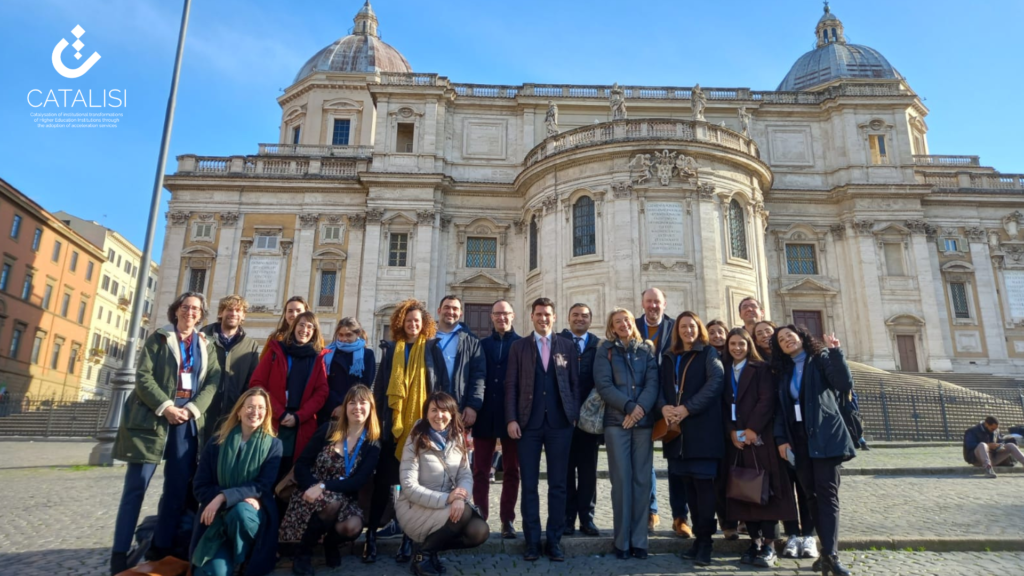The institutional transformation of the university towards greater sustainability can be divided into several areas. The first involves the university’s commitment to social engagement. In 2017. The University of Gdańsk was one of the first Polish universities to sign the Declaration on the Social Responsibility of Universities and, as a consequence, has its representation in the working group operating at the Team for Sustainable Development and Corporate Social Responsibility – a subsidiary body of the Minister of Funds and Regional Policy. It reports and disseminates its activities in this area in the Catalogue of Good Practices of Universities in ESG areas, which are published annually.
In 2019, the Commission for Social Responsibility was established at the University of Gdansk with the task of pursuing the strategic objective included in the “Strategy of the University of Gdansk for 2020-2025”, formulated as “Openness, social responsibility and engagement of the University”, building an academic community based on an academic culture of equality and developing and implementing a coherent monitoring system for gender equality.
Over the past few years, university-wide units have been established within the organisational structure of the University of Gdansk, which have taken and are taking action for sustainable development within the scope of their competences. On the area of cooperation and development, these include the Office of Analysis and Expertise, the Centre for Sustainable Development, and the Centre for Marine Research. The decisions to establish them have affected not only the university itself, but also its environment, by promoting education and disseminating knowledge for sustainable development through the exchange of scientific knowledge and experience between researchers of social and economic phenomena and strengthening cooperation between representatives of various scientific disciplines with business.
Established in 2017, the Centre for Analysis and Expertise, now the Office of Analysis and Expertise, as part of its activities initiates and builds collaborative networks for the implementation of research and expert opinions on issues such as: good quality education (objective 4), clean water and sanitation (objective 6), clean and accessible energy (objective 7), innovation, industry, infrastructure (objective 9), climate action (objective 13), life under water (objective 14), life on land (objective 15). An important aspect of the Bureau’s activities is to bring together researchers representing different scientific disciplines of the University of Gdansk and to obtain commissions for research, expert opinions, opinions on topics relevant to sustainable development. Recently, the Office of Analysis and Expertise has managed complex projects concerning pre-investment studies and environmental impacts of the construction and operation of artificial islands in the Baltic Sea. These studies covered a wide range of parameters including: noise, marine mammals, ichthyofauna. The Office of Analysis and Expertise coordinates the CALALISI project on the part of the University of Gdansk, paying particular attention to ESG and SDG issues.
In view of the increasing priority given to sustainable development issues, a unit dedicated to the SDGs – the Centre for Sustainable Development (CSD) – was established at the University of Gdansk in 2021. In addition to conducting research, the Centre carries out projects to educate and promote the idea of sustainable development among the academic community and in the socio-economic environment. It operates on the basis of 7 substantive programmes: Research and Projects, International Cooperation, Education for Sustainable Development, Green University, Cooperation with the Social Environment, Culturally about Sustainable Development, Conversations about Sustainable Development and one practical one: the Internship Programme. The Centre undertakes specific educational activities for sustainable development by creating or co-creating, among others, postgraduate programmes on sustainable development such as: Education for Sustainable Development: offshore wind energy, Outdoor Education, Mitigation and Adaptation to Climate Change. Centre’s activities also focus on raising awareness of sustainability through cultural activities, e.g. through the implementation of projects, a virtual bookshelf; the organisation of meetings on the challenges of the modern world: “Difficult migrations. On the refugee crisis once again’, ‘For Ukraine, with Ukraine. Experiences and perspectives’, “Good education in times of crisis” or active participation in international events: Global Crusade e-culture for all (Latin America-Europe Cultural Ring). The Green University programme, in turn, implements initiatives to reduce the university’s carbon footprint by: using green energy from renewable sources, implementing procedures to reduce electricity and heat consumption and waste generation, applying CSR (cooperate social resposibility) procedures in public procurement.
The Centre coordinates or participates in national and international research, teaching and development projects:
We zero emissions – knowledge transfer from the University of Gdansk
The project includes activities to popularise anti-emissions, aimed at students and teachers of primary and secondary schools in Pomerania, as well as students and university staff.
TOWNSHIP – Towards Sustainable Beautiful and Inclusive Cities
The project will result in three Intensive International Training Programmes (IMPK) to increase the internationalisation of UG’s educational offer.
CIR-CO-WAY – Polish-Norwegian way to the circular cooperation in industrial, science and technology parks
The project is about Polish-Norwegian cooperation to increase the competence and role of science, industry and technology parks in green transformation, especially in the context of a circular economy.
REGIONS2030: Monitoring the SDGs in EU regions – filling the data gaps
The aim of the project is to develop indicators for monitoring the implementation of the Sustainable Development Goals (SDGs) at the NUTS II level of the European Union.
RE-WIRING – Realising Girls’ and Women’s Inclusion, Representation and Empowerment
The aim of the RE-WIRING project is to analyse the prevailing legal, political, social and cultural and educational approaches that contribute to discrimination against women and girls with a view to change, by redesigning existing legal, policy and institutional approaches.





































